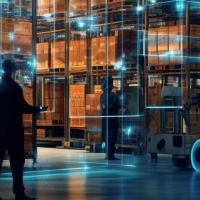The logistics and supply chain sector, an essential part of global economics, guarantees the seamless movement of goods worldwide. The current complex and connected world confronts many challenges, including inventory management and overall operational efficiency improvement. It requires seamless coordination of various domains, such as transport, scheduling, and customer support. AI is now an empowering technology in supply chain and logistics management.
It offers options that can automate the mundane, improve routes, strengthen security, lower costs, and improve customer service. With the help of AI, companies can enjoy improved efficiency in operations and increased customer satisfaction and profit.
In this blog post, we’ll discuss examples of AI In Logistics and supply chains.
What Is Artificial Intelligence In Logistics And Supply Chain?
Artificial Intelligence is a developing technology that attempts to produce the same human-like intelligence by using machines. This allows them to carry out various basic and highly complicated tasks. It is now an integral element of all businesses, including logistics, and supply chain business isn’t an exception.
AI within the supply and logistic chain gives real-time information, which saves time and money, decreases waste, and makes the process more effective. A variety of AI is used in supply chain and logistics. Some of these are listed below.
Natural Language Processing (NLP)
NLP is a type of AI that allows computers to understand, create human language, and modify it. NLP increases accuracy and efficiency across a variety of applications within logistics as well as the supply chain. Natural language processing is changing information handling throughout all supply chain stages. It can translate information regarding international shipments, respond to customers’ needs in real-time, and even provide voice-activated commanding for warehouse operations.
Machine Learning
In logistics, machine learning employs advanced statistical models to optimize routing and automate the process of fulfilling orders. It anticipates demand for materials and suppliers, anticipates disruptions to the supply chain, cuts down transport costs, and determines demand patterns.
Robotic
The advancement of robotics has revolutionized the logistics and supply chain industry. Business owners can improve their profits by making their supply chains transparent and increasing visibility. Robotics may alter automated inventory management, warehouse operations, forecasting, and customer experiences.
AI’s Role In The Supply Chain
With the help of AI-driven technologies, companies are changing their supply chain, inventory management, and demand forecasting methods. It results in greater efficiency and the ability to adapt and compete in a highly competitive market. It begins with acquiring the raw materials through the suppliers and concludes with delivering the final product to the final client. Businesses can employ AI to make informed choices concerning material purchases, enhance the storage capacity of their inventory, develop production plans, and more.
For logistics, AI enables intelligent decision-making and ensures efficient use of resources while minimizing expenses. AI can optimize the delivery route, predict maintenance requirements, and decrease fuel consumption by monitoring and analyzing transportation data in real-time. Additionally, AI-powered predictive analytics will improve supply chain management by forecasting demand, optimizing stock levels, and enhancing efficiency. Continuous development and the implementation of AI technology hold enormous potential shortly for logistics and supply chain sectors, enabling further advances and innovations.
Key Benefits Of AI In Logistic And Supply Chain Management
The previous statistic clarified why businesses use AI for their logistics and supply chain. Learn why using AI in the supply and logistics chain will benefit you. A few advantages provide an incentive to utilize AI within the supply chain.
Improved Delivery Accuracy And Speed
Increased delivery accuracy and speed are among the main advantages of AI in the supply chain. Through AI-powered optimization, logistics companies can quickly look up data from delivery points and other parts to enhance routing and schedules. This not only reduces errors but also increases effectiveness and speed. Industry-specific companies may seek the aid of a travel application design company to incorporate AI solutions. This helps improve these features, seamlessly integrating AI-powered capabilities in logistics providers.
Automated Inventory Management
Automating inventory management can be crucial in improving warehouses’ effectiveness. The usage inventory allows logistic companies to keep track of inventory levels, streamline replenishment procedures, and reduce the possibility of shortages. Picking orders can be simplified and automated using AI And Logistics, which analyze data covering the inventory level, demand patterns, and other variables. This reduces the chance of errors, improves productivity, and improves utilization, resulting in greater efficiency in warehouse operations.
Optimal Resource Allocation
Artificial Intelligence software can analyze massive amounts of data to identify the most efficient distribution centers, trusted suppliers, and the most efficient routes. Utilizing AI to manage warehouses optimizes the utilization of resources through the analysis of details on inventory levels and storage capacities as well as the fluctuations in demand. It allows for efficient utilization of space in warehouses and helps reduce the amount of waste.
The layout of warehouses and effective use of space can improve operational efficiency. By utilizing AI-driven optimization techniques, logistics companies can analyze information regarding product demand, inventory levels, and other factors affecting warehouse layout and increasing space utilization. AI will optimize warehouse space by recommending the best utilization of storage spaces. It could involve changing the arrangement of shelves, racks, or containers to fit items of different sizes or storage needs. The precise optimization of the space reduces the time for packing and picking, increases storage capacity, and improves the overall efficiency of operations.
Fraud Detection
Utilizing sophisticated AI algorithms and machine learning methods, AI in supply chains can detect fraudulent transactions. They can detect fraud. AI machines are proficient in analyzing the vast amount of data associated with transactional transactions in the supply chain. They can spot complex patterns, anomalies, or irregularities that might indicate suspicious activities. This includes fraud in the form of fake orders and unauthorized transfer of funds. For example, Convoy, the leading electronic freight service, is introducing a live fraud detection tool that continuously checks carriers’ risk and takes proactive steps to stop fraud before it occurs.
Streamlined Process
Companies manage supply chains with artificial intelligence that simulates and recommends the best routes. However, IoT app development services allow the integration of artificial intelligence-generated apps into existing platforms. These streamline processes, including ordering, communicating with stakeholders, and collaboration, and they also improve productivity overall.
Seamless Customer Service
AI can provide real-time order tracking and personalized messages, improving customer service within the logistics industry. Chatbots and virtual assistance provide continuous support and notifications. Predictive analytics help predict customers’ needs and optimize inventory to provide great customer satisfaction.
Monitoring And Tracking Of Shipment
A reliable tracking system and monitoring shipping is vital to guarantee prompt and safe delivery. AI-based logistics and supply chains enable businesses to keep track of shipments in real time and immediately receive notification of difficulties or delays. Furthermore, AI algorithms adeptly analyze information about shipping routes, like delivery time and other factors, and can anticipate potential issues and adopt proactive steps to fix these issues.
The AI algorithms can analyze data about the delivery location, traffic patterns, and many other aspects to enhance scheduling and delivery routes and help decrease delivery time, improve efficiency, and boost the satisfaction of customers. This ensures the shipments arrive on time and in perfect condition, improving customer efficiency and satisfaction.
Real-Time Monitoring
AI used in the supply chain provides immediate transparency into the movement of vehicles and goods. Businesses in this industry can continually monitor and change the status of their shipment. This enables proactive decision-making and effective problem-solving for optimal processes in the supply chain. But, monitoring systems need to be in place to evaluate the model’s performance regularly. It is possible to update models regularly using the assistance of maintenance and support for mobile application service providers to ensure your models’ accuracy and relevance.
Load-Planning
AI helps in planning load throughout the supply chain by studying vast quantities of data, including shipment volume locations, destination, and delivery times. Also, AI optimizes the distribution of cargo to trucks or containers by considering factors such as limitations on weight, the efficiency of routes, and the delivery location. AI can also adjust to live shifts, allowing logistics teams to adapt to disruptions or the addition of new demands swiftly. This improves efficiency, lowers the cost of transportation, and guarantees punctual delivery times, thus improving the supply chain productivity.
Predictive Analytics
Machine learning (ML) for supply chain management draws upon a vast knowledge base that allows it to create highly accurate predictions due to its incredible learning capabilities. ML algorithms have a knack for identifying key patterns and variables that affect the performance of supply chains, making it easier for employees to make informed choices regarding inventory and warehouse management and significantly increasing effectiveness.
The effectiveness and precision of ML surpass manual data processing, which takes up valuable time and money. AI constantly improves the accuracy of the supply chain process and has applications for local and global demand forecasting. This prevents the bullwhip effect and optimizes stock levels using technology-driven predictive analytics.
Examples Of Artificial Intelligence In Supply Chain And Logistics
Artificial Intelligence (AI) has been altering many fields, including the supply chain and logistics sector, which isn’t one of them. Firms can use AI-powered tools to streamline the supply chain process, reducing costs while increasing efficiency.
FOURKITES
FOURKITES is a logistics company that has AI to track real-time fleet vehicles along roads, in the ocean, and even in the air. The logistics industry uses the company’s visibility technology, shippers, carriers, and service suppliers. Its Fin AI, a natural technology that can automate tedious tasks such as estimating the consequences downstream of supply chain events, tracks 3 million deliveries per day with over 6000 data points and an average of 18 million ETAs.
Vorto
Vorto, an AI-driven system, works with shippers, providers, and carriers to improve supply chain efficiency. The platform for supply chain automation aims to minimize carbon emissions associated with transporting goods through supply chains while improving the standard of living for roughly 3.5 million truckers by furthering their work. It is used by Fortune 500 companies throughout North America. Vorto’s technology streamlines the steps of processing, analysis, and decision-making.
Epicor
Epicor utilizes Microsoft Azure, a cloud-based AI solution platform that helps improve its solutions to businesses designed for distributors and producers. AI Logistics Solutions include supply chain management logistics and supply chain efficiency. Epicor has also considered using Microsoft’s speech-to-text technology and advanced search features to make it easier for users to interact with its apps.
Echo
Echo, the company that manages transportation, employs AI to offer supply chain solutions that improve logistical and transportation requirements so customers can ship their items promptly, efficiently, and securely. The services include rate negotiation, procuring transportation services, shipping monitoring and execution, carrier control and selection, reports, and compliance, dashboards, and detailed reports on the shipment.
The intelligent applications for supply chain management offered by Infor utilize advanced algorithms to bring together the physical and digital realms to allow companies access to deep insights and make more educated business choices. Solutions cover supply chain planning, automating procure-to-pay, supply chain finance, supply chain management, visibility, transportation management, and the management of warehouses.
Zebra’s supply chain and logistics AI solutions comprise SmartPack Trailer, which combines hardware, software, and data analytics to give real-time insights into the loading process to improve effectiveness. Particular benefits are the efficient use of space, which allows you to ship smaller amounts of air and lower operational costs. It also allows faster and more efficient handling of parcels, decreased damage to the parcel and its loss, and improved worker safety.
Manufacturers utilize C3 AI’s artificial intelligence-powered inventory optimization to control the inventory level in real-time over purchase components, components, and finished products. With advanced machine-learning algorithms, the C3 AI software continuously learns from the information gleaned from orders for production, supply orders, and purchase orders to determine stocking suggestions, among others.
Use Case Of AI In Supply Chain Management
The logistics sector is transforming. Companies are becoming increasingly embarrassed by AI-powered logistical services, which improve supply chain control and reduce excessive costs. Here are some cases of AI being used for supply chain management.
Predictive Maintenance
Equipment maintenance is among the significant challenges for logistics and supply chain firms. However, AI algorithms analyze data from sensors and other sources to identify the likelihood of equipment breaking down, which allows companies to plan maintenance beforehand to avoid any further issues. Companies can, therefore, prepare for the possibility of a machine breakdown, which reduces the possibility of unplanned breakdowns and improves overall effectiveness.
Forecasting Demand
Accurately predicting customers’ demand is crucial to a supply chain’s success, and AI algorithms can achieve this using data derived from inventory, sales, and past trends. The data generated by this analysis provides more precise forecasts, optimizes inventory levels, and reduces the possibility of inventory shortages and stock-outs. Moreover, it ensures that the products are readily available at the required time and place.
Optimization Of The Route
Transportation is an inevitable cost for supply chain companies. However, optimizing routes could help save costs while increasing effectiveness. AI algorithms can improve routes for delivery by studying factors like weather, traffic, and roads. These data are then utilized to determine the most efficient route for every delivery. This reduces the cost of fuel, decreases emissions, and improves delivery time.
Automation Of Warehouses
AI-powered robots can assist in warehouse processes, including sorting, picking, and packing. The technology reduces labor costs and can increase accuracy and effectiveness since robotics can operate all day, seven days a week.
Value Chain Analysis
AI helps study the present situation by generating the value stream, which connects all the information sources. It also helps to determine the possibility of making cuts, enhancements, or price changes. Makes machine learning to find patterns, forecast outcomes, and distribution of resources to achieve objectives. AI embedding into the company will benefit your organization due to increased efficiency and capacity to adjust and respond better to changes in the market.
Customer Care Services
AI improves the customer service process via chatbots and virtual assistants, which offer 24/7 customer support. AI systems can answer queries faster and speed up response time. Natural Language Processing (NLP) helps AI systems comprehend and respond to customer inquiries, which improves overall customer satisfaction.
Sentiment analytics analyzes consumers’ sentiments by analyzing customer comments and social media information. This allows firms to spot areas that require improvement and quickly process data by utilizing AI-generated personalized recommendations and specific product recommendations based on the history of purchases and preferences. So, the overall experience for customers improves.
Risk Management
Managing supply chain risks is increasingly crucial and crucial, particularly in the present uncertain and complex world economy. Risk management tools powered by AI can assist by monitoring data from various sources, such as news feeds and social media. The system can identify potential threats, like cyber-attacks, supply chain disruptions, and natural catastrophes, that help companies make informed decisions to minimize risk.
Future Of Artificial Intelligence In The Logistics & Supply Chain Industry
A bright future for AI advancement holds enormous potential for the supply chain and logistics industries. AI and supply chain technology could transform business processes and improve efficiency, responsiveness, and accuracy. Moreover, advancements in supply chain technology would result in improved customer service and transparency.
Automation Vehicles
Autonomous vehicles used in the logistics and supply chain industry are anticipated to rise. This will result in the secure and effective delivery of products. The future will see logistic app development firms significantly harness AI technology to incorporate autonomous vehicles for transport and delivery. This can reduce costs, increase security, and increase efficiency.
Predictive Analytics
Predictive analytics will soon play an essential part in supply chains and logistics. The future will be when AI-generated instruments or methods can analyze vast amounts of data to predict demand patterns, improve routes, and disrupt Androids before disruptions occur by using historical data, advanced algorithms, and updated information in real time. Companies can make more educated decisions and increase the efficiency of their processes.
Robotic And Automation
The future will see AI-powered robots that can assist in automatizing tasks such as packaging, picking, and shipping. They will also reduce the expense of fulfillment and enhance effectiveness. AI firms continue inventing robots and automation technology, allowing businesses to use intelligent robots for warehouse or order fulfillment and other repetitive tasks.
Let’s Wrap Up
Artificial intelligence can transform the way logistics is conducted, offering businesses new methods to improve efficiency. AI In Transportation And Logistics is transforming the manufacturing sector and providing a major opportunity for companies to enhance customer satisfaction and efficiency.
From the concept of predictive maintenance and risk management, AI has transformed the logistics and supply chain sector, improving efficiency, cost-effectiveness, and durability. Using AI-powered tools is essential for staying modern in today’s competitive global market. We anticipate witnessing more advancements shortly as businesses explore different ways of leveraging AI. AI-generated applications enhance and automate route planning, forecasting demand, inventory management, and live tracking. They result in cost savings, efficiency, improved resource utilization, speedy delivery, and higher customer satisfaction.

























